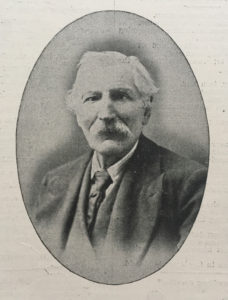
William Henry Bebee
HONORED DORSET RESIDENT.
Throughout His Long Residence in the Town of Dorset Hon. William H. Bebee Has Had the Respect of His Fellow Townsmen, and Often Publicly Honored by Their Votes.
The octogenarian, Hon. William Henry Bebee of North Dorset, whose portrait appears on page 1, was born in Manchester, July 26, 1822. Two years later his parents, Mr. and Mrs. William Bebee (nee Sally Gifford), moved to East Dorset into a house on the present site of Mr. Buftum Parris Bowen’s residence and shortly after, into the James O’Brien house, in what is now known as Freedleyville, and a little later still, into a block house—a house made of hewn oak logs—standing over the little stream a few rods south of Hon. James M. Bebee’s. Here and in the two houses to the south and north of that stream was the home and fixed habitation of the Bebee family–till the sale to the son, James M., in the spring of 1890.
The block house farm was small, and had, at the time of the sale, been in the family some sixty-five years. A house and barn had been built on it and the Bromley and Hulett farms, so called, with good buildings, had been bought on, and altogether the farm consists of 245 productive acres.
After selling to his son, Mr. Bebee bought the Austin Ladd farm in North Dorset, where ever since has been his home. The farm contained 250 acres and included the Lake Emerald, except the island, a much frequented and growing pleasure resort. Some cottage sites on the lake have since been sold and on two of them cottages have already been built. Mr. Bebee has a boathouse and boats for picnickers and pleasure seekers, and the railway company smiles on them and accommodates them with an outdoor station at the lake. A part of the Charles Luther realty has been added by purchase to the Ladd farm, and the buildings have had extensive repairs and additions and Mr. Bebee now has again a good, comfortable home quite to his taste.
“He that by the plow would thrive, Must either hold, himself, or drive.”
Mr. Bebee has done both and prospered. But it is not by his achievements between plow handles that he is wholly or principally to be estimated or measured. An old poet warbles:
“Could I in stature reach the pole, Or grasp creation in any span, I’d still be measured by my soul—The mind’s the standard of the man.”
Mr. Bebee has been a selectman of Dorset—most of the time continuously—some twenty-five years and has held more town offices in Dorset, and longer, than any other man of his day or ever, probably; and notwithstanding he has always been known as a democrat of the “most strictest sect” and regarded by republicans as “wild as a hawk” on national politics, Dorset, always republican, elected him town representative in 1869 and 1872. He has been nominated for all the important county offices of our county by his party times too numerous to name, and very likely had they been able to elect he would now be addressed as “Governor.”
No other so natural born town politician probably was ever let loose in our north shire as the Hon. William Henry Bebee. As a pettifogger or “natural crook” in years agone, Mr. Bebee was quite a success. His preference was for the defense and he not infrequently put professional Blackstone under a cloud. He was never marked absent at our lyceums and was always ready to prove that black was white or the converse, as he might be assigned on the question; and whichever way he argued, commonly got the lion’s share of decisions.
Mr. Bebee married Miss Angeline Tryon December 20, 1849. To them were born four sons and two daughters. Of these, three survive—Mrs. James M. Bates of Norwich, Conn., Hon. James M., Dorset’s present town representative, and William G. of Manchester, a prosperous marble dealer, with a plant at Manchester Center.
Mr. Bebee is a self-made man, easily accessible by all, with no dude, Beau Brummell or blue blood in his veins. He doesn’t tread on the heels of fashion, cisatlantic or transatlantic, in dress, and were the question for debate, “Does the wool of a sheep make a gentleman?” he would naturally argue the negative. The age of four score years finds him in somewhat feeble health, but still in the harness of farm life and care, holding the lone office of town grand juror and pluckily keeping at bay “the last enemy, the fierce monster of the glass and scythe.”
E. M. TORREY.
